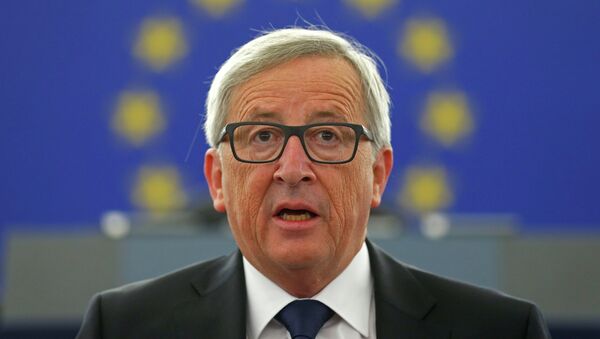The pressure on Juncker comes as member states remain divided on whether to accelerate EU integration or take a more pragmatic approach to centralizing power in the wake of the UK's referendum decision.
As debate continues on the EU's future in the face of growing Euroskepticism, a German government minister told the Sunday Times newspaper that German Chancellor Angela Merkel had come to view Juncker as "part of the problem" with the EU.
Brexit is as much Juncker's failure as any other politician involved and he should resign. https://t.co/wUx9GLDL0U
— ChristinaD (@fitalass) July 3, 2016
"Juncker has time and again acted against the common interest, and his reaction to the British referendum has been very damaging," the source said.
It's understood that Juncker's language about Northern Ireland and Scotland — including his meeting with SNP leader Nicola Sturgeon — ruffled feathers across the bloc, and were seen by Berlin as being "unnecessarily provocative."
#Brexit, if this does not trigger self-reflection and greater democracy of EU institutions, then they must go. #JunckerResign!!
— Ivan Niccolai (@Ivan_niccolai) June 29, 2016
"This is not a time for institutional bickering," the source added, "but the pressure for him to resign will only become greater and chancellor Merkel will eventually have to deal with this next year."
The comments aren't the first to speculate on Juncker's position as EC chief, with Czech foreign minister Lubomir Zaoralek suggesting the 61-year-old should "contemplate quitting" after the UK voted to leave the bloc.
Will Juncker resign as Czech min urged? EC says as last week answer has two letters 'the first is N'
— Danny Kemp (@dannyctkemp) June 27, 2016
"Right now I can't see the European Commission chairman as the right man for the job," Mr Zaoralek told local media.
"I don't want to call on anyone [to resign], but… someone in the EU maybe should contemplate quitting, because [Brexit] is a responsibility someone should have assumed."
Integration at Heart of EU Divide
The disagreements across the EU are based on differing opinions over continued integration in the face of growing euroskepticism.
While Juncker, along with nations such as France and Belgium, have been strong proponents of further European integration, and have seen Brexit as a chance to speed up such processes, a number of other member states have rejected such ideas, with German officials arguing that a more pragmatic, less centralized approach to EU membership needs to be adopted in the wake of rising anti-EU sentiment.
Becoming increasingly clear that the real backlash against EU integration is about movement of labour, not capital…
— Jonathan Hopkin (@jrhopkin) July 1, 2016
A number of Eastern European member states have already expressed concern over Juncker's leadership, leading to reports Germany could team up and try and force him to step aside.
This division has also been evident in the response of various EU leaders to the UK's referendum decision to lave the EU.
Sturgeon know she must not overplay her hand. Idea of Scots voting to join the euro and much more EU integration seems rather fanciful.
— Patrick O'Flynn (@oflynnmep) June 26, 2016
While German Chancellor Merkel has urged member states to give the UK time before triggering Brexit negotiations, others such as France have looked to place pressure on London to kick off talks sooner rather than later to avoid ongoing uncertainty.
UK government officials have argued that Article 50, the trigger needed to start Brexit discussions, should not be taken until either later this year or early 2017 to give officials more time to prepare for negotiations with Brussels.


